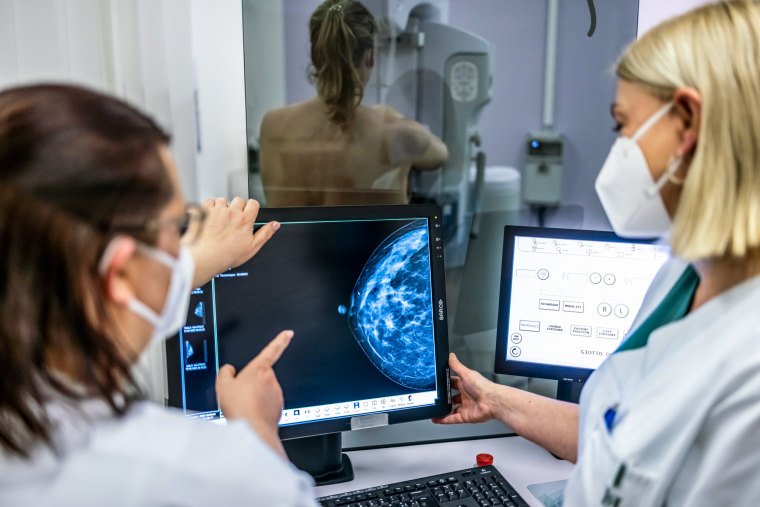The U.S. Preventive Services Task Force has released official new guidelines stating that women in their 40s and older should undergo a mammogram every other year.
In Short
- Us preventive services task force updates mammogram guidelines.
- Recommendations now include biennial screenings for women starting at age 40.
- Impact on women’s health and early cancer detection discussed.
TFD – Discover the latest mammogram guidelines recommended by the task force, providing essential insights into breast cancer screening for women.

Starting at age 40, women should have a mammogram every other year, under new recommendations released on Tuesday by the US Preventive Services Task Force.
It’s a considerable drop in age from the prior recommendations, which said women should start getting biennial screenings no later than age 50 and suggested that women in their 40s could talk to their doctor about getting screened.
The proposal was first made public as a draft last year and was made in response to the growing number of women in their 40s who are being diagnosed with cancer and the data showing early mammograms can save lives. The rate of breast cancer among women ages 40 to 49 increased 2% per year, on average, from 2015 to 2019, according to the National Cancer Institute.
The task force chair, Dr. Wanda Nicholson, stated, “This rising incidence of breast cancer in women in their 40s points to mammography being even more beneficial.”
The group, an independent panel of experts, estimated that its new recommendations — which were published Tuesday in the journal JAMA — could save up to 20% more lives relative to the old guidance.
When deciding on coverage and payments, insurance companies frequently abide by the task force’s recommendations; however, many policies already include mammograms for women beginning at age 40.
Mammograms, or X-ray scans of the breast, are ordered by primary care physicians or obstetrician-gynecologists for their patients. A technician at an imaging center or radiology department normally performs the procedure. Patients sandwich each breast between two plates, and a machine scans the tissue inside their breasts to produce X-ray images.
Patients may require further mammograms, an ultrasound, or occasionally a biopsy or MRI if suspicious lesions are discovered on the images. These tests are necessary to ascertain whether cancer is present.
Women who have a personal history of breast cancer, those who had an abnormality on a prior biopsy, or those who have a genetic marker for breast cancer are not covered by the task force’s revised guidelines; instead, they may need to undergo screening more frequently and earlier.
The recommendations also only apply to women up to age 74.
Leading medical organizations claimed that the task force’s updated recommendations still fall short.
For women between the ages of 45 and 54, the American Cancer Society advises yearly screenings instead of every other year. Once they hit 55, they can choose to move to biennial tests. As long as women are anticipated to survive for at least ten more years, it is not advised that they cease tests at a specific age.
“We are disappointed that the updated USPSTF screening recommendations do not include women over the age of 74,” the ACS said in a statement. “Millions of women over 75 are in excellent health and should have a long life ahead of them, which increases their risk of breast cancer.”
However, Nicholson stated that insufficient data supported the task force’s recommendation that women 75 years of age and older get mammograms.
“We want to reassure people that women 75 years of age and older are not forgotten,” the spokesperson stated. “We urgently need additional research on this population,”
The American College of Radiology, meanwhile, expressed disappointment that the task force did not suggest yearly screenings starting at age 40, as the college recommends.
The American Cancer Society advises all women, but particularly Black and Jewish women, to discuss their risk of breast cancer with their physicians prior to turning 25. Jewish women of Eastern European ancestry have an above-average risk of breast cancer, and black women are forty percent more likely than white women to die from the disease.
But according to the task force’s investigation, yearly scans can produce more false positive results, which might result in needless biopsies or women being treated for tumors that aren’t necessarily dangerous to their health.
According to Nicholson, “the benefits and harms of screening every other year compared to every year had a much more favorable balance.”
According to Dr. Phoebe Freer, head of breast imaging at the Huntsman Cancer Institute at the University of Utah, many women would still rather get examined every year.
“Usually, the risk is just being called back for extra pictures — maybe an ultrasound and after that being told that the woman’s fine and she can go back to routine screening. Most women are willing to tolerate that risk for that extra mortality reduction,” she said.
The American College of Radiology (ACR) also suggests that women with thick breasts—who are linked to a higher risk of breast cancer—have an extra MRI per year. However, the task panel stated that further research was necessary before recommending that for women whose breast tissue is denser.
Is it feasible that more imaging could contribute to their longer, healthier lives? In the end, the evidence simply isn’t there according to our present evaluation,” Nicholson stated.
Conclusion
The updated mammogram guidelines offer valuable insights into early breast cancer detection, emphasizing the importance of regular screenings for women’s health and well-being.
Connect with us for the Latest, Current, and Breaking News news updates and videos from thefoxdaily.com. The most recent news in the United States, around the world , in business, opinion, technology, politics, and sports, follow Thefoxdaily on X, Facebook, and Instagram .
